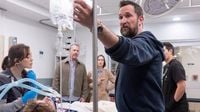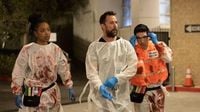As the gripping first season of HBO's The Pitt continues to unfold, the medical drama has set a new standard for realism in its portrayal of life in an emergency room. Created by R. Scott Gemmill and executive produced by John Wells and Noah Wyle, the show follows a single, nightmarish shift in an emergency department, bringing viewers into the heart of chaos and the emotional toll it takes on medical professionals.
In Episode 14, titled "8 PM," which premiered on April 3, 2025, the aftermath of the Pitt Fest shooting lingers heavily over the staff of Pittsburgh Trauma Medical Hospital. The episode opens with Dr. Michael "Robby" Robinavitch (Noah Wyle) in a vulnerable state, having just lost his stepson's girlfriend, Leah, to a gunshot wound. This heartbreaking moment pushes him into a full breakdown, encapsulating the intense emotional strain that healthcare workers often face.
Wyle's portrayal of Dr. Robby has been widely praised for its authenticity, particularly in how it reflects the mental health struggles of those in the medical field. After failing to save Leah, Robby finds himself in a fetal position, overwhelmed by grief and guilt. His colleague, Dr. Whitaker (Gerran Howell), steps in to pull him back from the brink, reminding him, "If you don’t [come out], we’re f--ked," emphasizing the dire situation in the ER.
The Pitt has made headlines not just for its gripping storylines but also for its willingness to tackle the harsh realities of emergency medicine. The series has depicted graphic scenes, including a woman's horrific foot injury after being run over by a train in Episode 1 and the raw depiction of natural childbirth in Episode 11. Such scenes serve to highlight the fragility of life and the incredible challenges faced by ER staff.
Throughout the season, the show has explored themes of trauma and resilience. Episode 9 showcased the frightening lack of security in hospitals, illustrated by a brutal attack on Nurse Dana Evans (Katherine LaNasa). This reality reflects genuine issues within the healthcare system, making The Pitt stand out from other medical dramas that often gloss over such critical topics.
In the latest episode, the identity of the Pitt Fest shooter is revealed in a manner that subverts typical crime drama tropes. Rather than focusing on the shooter, the narrative centers on the emotional fallout for the healthcare workers and the victims' families. This approach reinforces the show's thesis: it is primarily about the experiences of healthcare workers and their patients, rather than sensationalizing the crime itself.
Dr. Robby’s character arc has been particularly poignant. He grapples with the trauma of losing patients, including the recent death of a child due to drowning in Episode 8, and the anniversary of his mentor's death from COVID-19. The series does not shy away from showing the grief that accompanies such losses, illustrating how these experiences shape the doctors' mental health.
In a touching moment during Episode 14, Dr. Robby tells a young patient, David, "Having bad thoughts doesn’t make you a bad person," highlighting the importance of empathy in the face of mental health challenges. This conversation reflects a broader commentary on the struggles that young men face today, a theme that has resonated with viewers and sparked discussions about masculinity and vulnerability.
Dr. Robby's breakdown and eventual return to work encapsulate the harsh reality that many healthcare professionals endure: the need to compartmentalize their emotions while dealing with life-and-death situations. As Wyle notes, many in the medical field prefer to bury themselves in work rather than confront the emotional weight of their experiences.
The show has also addressed systemic issues within healthcare, such as the corporate pressures that often prioritize profits over patient care. Chief Medical Officer Gloria Underwood (Michael Hyatt) frequently reprimands Dr. Robby for not focusing on the bottom line, illustrating the ongoing struggle between compassion and the business side of medicine.
As the season approaches its finale, the stakes continue to rise, and viewers are left questioning how the characters will cope with the cumulative trauma of their experiences. The Pitt has not only captivated audiences with its intense storytelling but has also been hailed for its medical accuracy, prompting conversations among healthcare professionals about the realities depicted on screen.
Wyle, reflecting on the show's impact, stated, "It’s clear that The Pitt has much greater designs." The series has opened a dialogue about the emotional toll of working in healthcare, and the responses from viewers—many of whom are healthcare workers themselves—have been overwhelmingly positive.
In a world where medical dramas often rely on melodrama and unrealistic portrayals, The Pitt stands as a groundbreaking series that challenges conventions. With its commitment to authenticity and emotional depth, it has quickly become a favorite among viewers, reshaping the landscape of television medical dramas.
As the final episodes of the season approach, fans eagerly anticipate how the characters will navigate their intertwined fates, all while grappling with the very real issues of mental health, trauma, and the complexities of modern healthcare.










